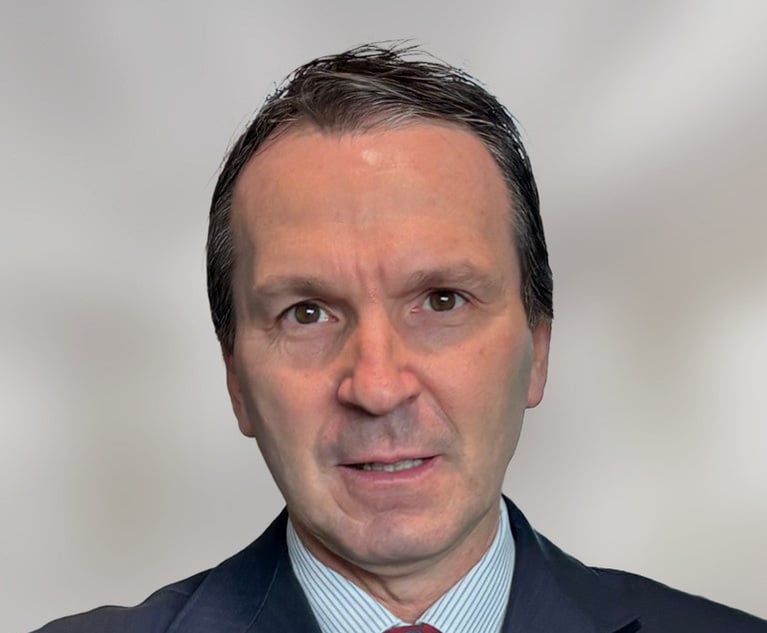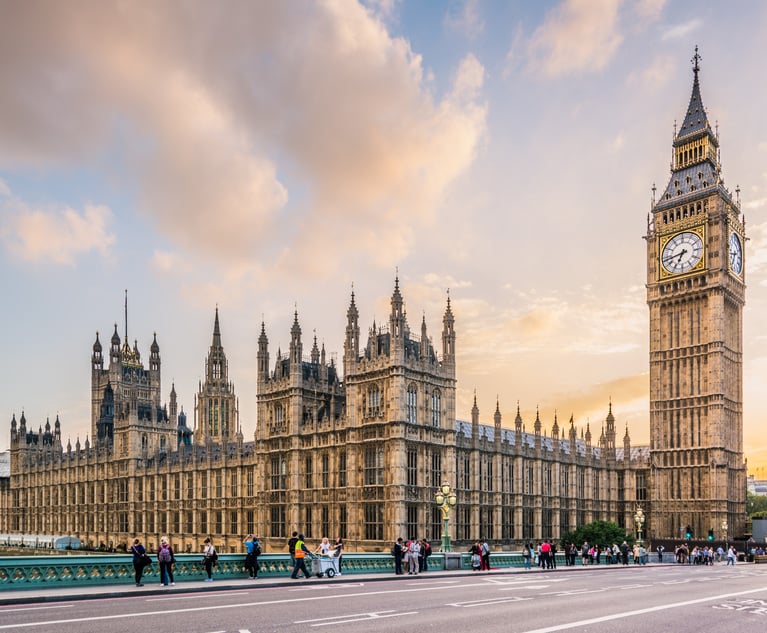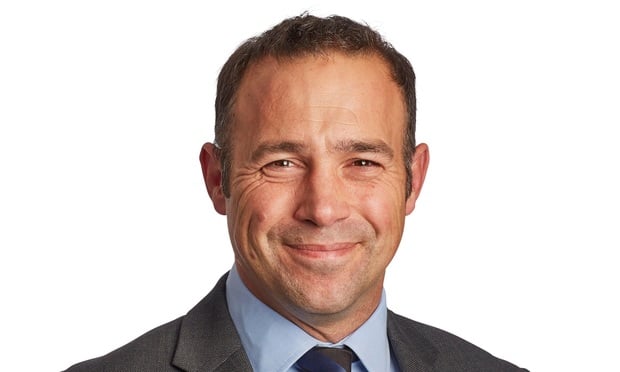HFW's COO On An Army Career and The Power Of Military Values Right Now
"At the end of the day, nobody's shooting at us."
April 20, 2020 at 06:44 AM
6 minute read
Sid Welham was appointed chief operating officer at HFW last year. He had previously worked at KPMG, and spent 12 years in the U.K. army. He discusses how he made the jump from the military to the legal profession, and what values he brought with him.
I had a blissfully ignorant childhood. I grew up in a small village in Pembrokeshire in west Wales. It's a beautiful part of the country, but very isolated, right on the edge of the UK.
I wanted to join the Army for as long as I can remember. I don't have any family links to the military – I guess I just thought it would be exciting, I'd get to travel and I've always enjoyed being outdoors.
I wasn't very focused on my academics. I wanted to leave school at 16 [the first point at which students in the UK can finish their education], but I begrudgingly stayed on for the final two years at my family's insistence.
After leaving school, I applied to attend the Royal Military Academy Sandhurst, the Army's officer training centre. The recruiting officer said I'd had too sheltered an upbringing and needed to go to University to get some life experience. So I went and got a degree in Applied Science. It was the first time that I'd actually enjoyed academia.
After graduating, I got accepted to Sandhurst and started what ended up being an 18-year career in the Army. I did operational tours in Northern Ireland, Kosovo, Iraq and Afghanistan. There were real highs – commanding an infantry company of about 200 men on operations was a great challenge. But there were also lows. Losing friends is tough.
I was a Staff Officer responsible for purchasing military equipment during the height of the conflicts in Iraq and Afghanistan. I was buying everything from sniper rifles to armoured personnel carriers and precision guided munitions. It was flat out.
I had the opportunity to attend the UK's Defence Academy for two years and redressed my willingness to study, gaining a Masters in Defence Technology.
My last role in the military was involved in strategic and operational planning at the UK military's operational headquarters in Northwood. I was responsible for supporting units in Afghanistan. My final six months in the Army were supposed to be a smooth transition into civilian life, but I was made chief of staff for the British team working as part of NATO in the campaign against the Gaddafi regime in Libya. Again, pretty full on and not the greatest preparation for transition.
My wife requalified as a teacher when we got married, and taught in military schools. She saw first-hand the issues children of military parents faced in having to constantly move schools when their family got posted, and the impact that had on their education. She made me promise that when our daughter got to school age, we'd stop moving – we'd already lived on six different military bases in eight years of marriage. So, when our daughter turned four, we bought a house in Amersham [a small market town in the Chiltern Hills, Buckinghamshire]. It's a great location and made a real difference for the family.
I really enjoyed my career in the Army, but it was time for a new challenge. When I decided I wanted to leave, I caught up with friends working in lots of different industries. They were mainly people that I had served with, who had got out of the Army before me. That led to a meeting with a senior partner at KPMG. After several informal chats over coffee, which turned out to be interviews, I was offered a role as an Operations Manager in KPMG's Financial Services division. I programme managed the buildout of KPMG's cyber practice, and project managed the restructuring of the firm's UK business. I worked my way up through the organisation over eight years, acting as COO for Financial Services Audit; Insurance and Investment Management; and, finally, Financial Services.
For some soldiers, the move from the Army to civilian life can be very challenging. I found the transition a lot easier than some of my colleagues. I went from Northwood – a large building with around 6,000 people, open plan office space, quite long hours and a fair amount of pressure – to KPMG in London – another large building with thousands of people, open plan office space, quite long hours and a fair amount of pressure. There were lots of parallels. I do miss the Army, but I don't regret the move. There are growing numbers of ex-military people within the legal industry. I'm on the committee of the newly established Military in Law Network – MiLNet. Soldiers do love a good acronym.
There are two sides to my role as COO at HFW. First is to ensure that business services are providing the most effective service to the business, to enable the firm to be as successful as possible. Second is to support Jeremy [Shebson, Managing Partner] and the rest of the senior management team in driving the firm forward. We've grown significantly in recent years – particularly internationally – and our sector focus gives us a strong differentiator, as clients know that we really understand their industries as well as their business. There are huge opportunities to build on the firm's current success, but this is a challenging and changing market, so the firm needs to think carefully about its future direction. There is a lot of work to be done.
A lot of values that the military hold dear are equally applicable in business life: teamwork, trust, respect for others, and commitment. These are really important to me and are values that I'll be looking to help strengthen at HFW.
My first impressions of HFW are really positive. There's a great vibe – people are clearly keen to see the firm succeed and grow. We've got real expertise across the firm, and teams of dedicated people who really want to deliver top quality client work. I'm excited to be here.
Being in the Army gives you a real sense of perspective. That's particularly important at the moment, with all the challenges and uncertainty of the Covid-19 outbreak. Client deadlines are clearly extremely important and we must always strive to give the best possible service in everything we do, but it has to be sustainable and we must look out for and support each other. It's about remembering that we work to live; not live to work. At the end of the day, nobody's shooting at us.
This content has been archived. It is available through our partners, LexisNexis® and Bloomberg Law.
To view this content, please continue to their sites.
Not a Lexis Subscriber?
Subscribe Now
Not a Bloomberg Law Subscriber?
Subscribe Now
NOT FOR REPRINT
© 2025 ALM Global, LLC, All Rights Reserved. Request academic re-use from www.copyright.com. All other uses, submit a request to [email protected]. For more information visit Asset & Logo Licensing.
You Might Like
View All

Clifford Chance Boosts Private Credit Offering With Second Partner Hire This Week
2 minute read
CMA Uses New Competition Powers to Investigate Google Over Search Advertising

‘A Slave Drivers' Contract’: Evri Legal Director Grilled by MPs
Trending Stories
- 1Can a Law Firm Institutionalize Its Culture? Boies Schiller’s New Chairman Will Try
- 2Full 8th Circuit Hears First Amendment Challenge to School District’s ‘Equity Training’
- 3Exploring Generative AI’s Impact on Intellectual Property
- 4Training Lawyers in AI and Using AI to Boost Training
- 5EB-5 Rebounds After a Rocky Year: Challenges of 2024 Lay Groundwork for a Booming 2025
Who Got The Work
J. Brugh Lower of Gibbons has entered an appearance for industrial equipment supplier Devco Corporation in a pending trademark infringement lawsuit. The suit, accusing the defendant of selling knock-off Graco products, was filed Dec. 18 in New Jersey District Court by Rivkin Radler on behalf of Graco Inc. and Graco Minnesota. The case, assigned to U.S. District Judge Zahid N. Quraishi, is 3:24-cv-11294, Graco Inc. et al v. Devco Corporation.
Who Got The Work
Rebecca Maller-Stein and Kent A. Yalowitz of Arnold & Porter Kaye Scholer have entered their appearances for Hanaco Venture Capital and its executives, Lior Prosor and David Frankel, in a pending securities lawsuit. The action, filed on Dec. 24 in New York Southern District Court by Zell, Aron & Co. on behalf of Goldeneye Advisors, accuses the defendants of negligently and fraudulently managing the plaintiff's $1 million investment. The case, assigned to U.S. District Judge Vernon S. Broderick, is 1:24-cv-09918, Goldeneye Advisors, LLC v. Hanaco Venture Capital, Ltd. et al.
Who Got The Work
Attorneys from A&O Shearman has stepped in as defense counsel for Toronto-Dominion Bank and other defendants in a pending securities class action. The suit, filed Dec. 11 in New York Southern District Court by Bleichmar Fonti & Auld, accuses the defendants of concealing the bank's 'pervasive' deficiencies in regards to its compliance with the Bank Secrecy Act and the quality of its anti-money laundering controls. The case, assigned to U.S. District Judge Arun Subramanian, is 1:24-cv-09445, Gonzalez v. The Toronto-Dominion Bank et al.
Who Got The Work
Crown Castle International, a Pennsylvania company providing shared communications infrastructure, has turned to Luke D. Wolf of Gordon Rees Scully Mansukhani to fend off a pending breach-of-contract lawsuit. The court action, filed Nov. 25 in Michigan Eastern District Court by Hooper Hathaway PC on behalf of The Town Residences LLC, accuses Crown Castle of failing to transfer approximately $30,000 in utility payments from T-Mobile in breach of a roof-top lease and assignment agreement. The case, assigned to U.S. District Judge Susan K. Declercq, is 2:24-cv-13131, The Town Residences LLC v. T-Mobile US, Inc. et al.
Who Got The Work
Wilfred P. Coronato and Daniel M. Schwartz of McCarter & English have stepped in as defense counsel to Electrolux Home Products Inc. in a pending product liability lawsuit. The court action, filed Nov. 26 in New York Eastern District Court by Poulos Lopiccolo PC and Nagel Rice LLP on behalf of David Stern, alleges that the defendant's refrigerators’ drawers and shelving repeatedly break and fall apart within months after purchase. The case, assigned to U.S. District Judge Joan M. Azrack, is 2:24-cv-08204, Stern v. Electrolux Home Products, Inc.
Featured Firms
Law Offices of Gary Martin Hays & Associates, P.C.
(470) 294-1674
Law Offices of Mark E. Salomone
(857) 444-6468
Smith & Hassler
(713) 739-1250









